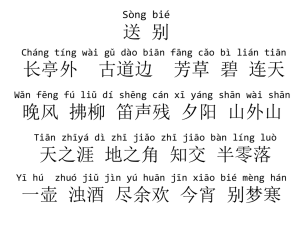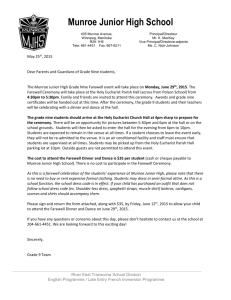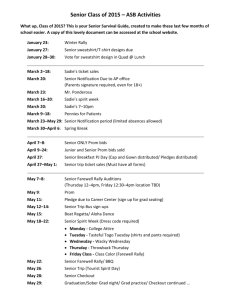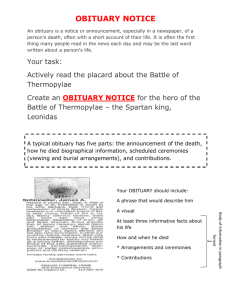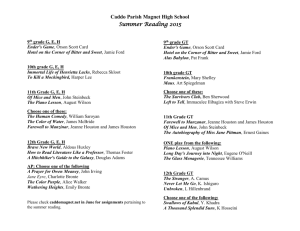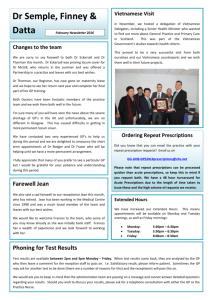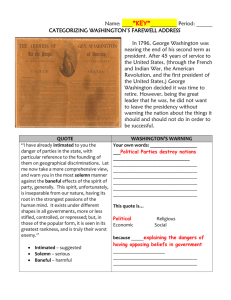George Washington`s Farewell Address left guidelines that he
advertisement
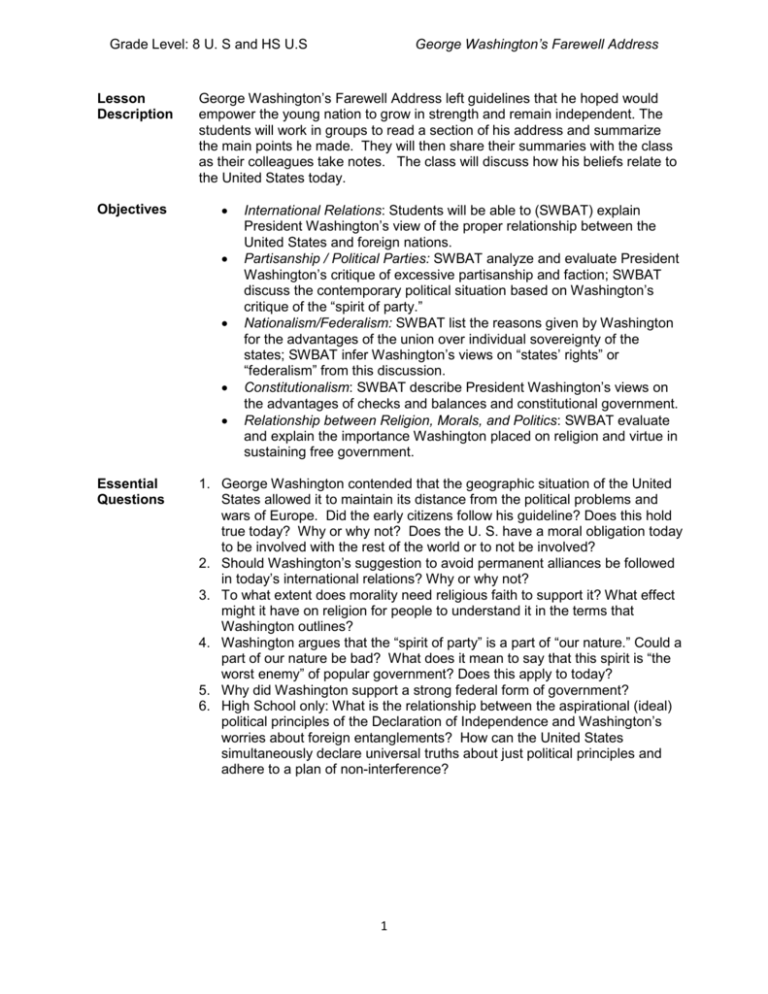
George Washington’s Farewell Address Grade Level: 8 U. S and HS U.S Lesson Description Objectives George Washington’s Farewell Address left guidelines that he hoped would empower the young nation to grow in strength and remain independent. The students will work in groups to read a section of his address and summarize the main points he made. They will then share their summaries with the class as their colleagues take notes. The class will discuss how his beliefs relate to the United States today. Essential Questions International Relations: Students will be able to (SWBAT) explain President Washington’s view of the proper relationship between the United States and foreign nations. Partisanship / Political Parties: SWBAT analyze and evaluate President Washington’s critique of excessive partisanship and faction; SWBAT discuss the contemporary political situation based on Washington’s critique of the “spirit of party.” Nationalism/Federalism: SWBAT list the reasons given by Washington for the advantages of the union over individual sovereignty of the states; SWBAT infer Washington’s views on “states’ rights” or “federalism” from this discussion. Constitutionalism: SWBAT describe President Washington’s views on the advantages of checks and balances and constitutional government. Relationship between Religion, Morals, and Politics: SWBAT evaluate and explain the importance Washington placed on religion and virtue in sustaining free government. 1. George Washington contended that the geographic situation of the United States allowed it to maintain its distance from the political problems and wars of Europe. Did the early citizens follow his guideline? Does this hold true today? Why or why not? Does the U. S. have a moral obligation today to be involved with the rest of the world or to not be involved? 2. Should Washington’s suggestion to avoid permanent alliances be followed in today’s international relations? Why or why not? 3. To what extent does morality need religious faith to support it? What effect might it have on religion for people to understand it in the terms that Washington outlines? 4. Washington argues that the “spirit of party” is a part of “our nature.” Could a part of our nature be bad? What does it mean to say that this spirit is “the worst enemy” of popular government? Does this apply to today? 5. Why did Washington support a strong federal form of government? 6. High School only: What is the relationship between the aspirational (ideal) political principles of the Declaration of Independence and Washington’s worries about foreign entanglements? How can the United States simultaneously declare universal truths about just political principles and adhere to a plan of non-interference? 1 George Washington’s Farewell Address Grade Level: 8 U. S and HS U.S 8th Grade U. S. History: Texas Essential Knowledge and Skills (Target standards) (5) History. The student understands the challenges confronted by the government and its leaders in the early years of the republic and the Age of Jackson. The student is expected to: (E) identify the foreign policies of presidents Washington through Monroe and explain the impact of Washington's Farewell Address and the Monroe Doctrine; (29) Social studies skills. The student applies critical-thinking skills to organize and use information acquired through established research methodologies from a variety of valid sources, including electronic technology. The student is expected to: (B) analyze information by sequencing, categorizing, identifying cause-andeffect relationships, comparing, contrasting, finding the main idea, summarizing, making generalizations and predictions, and drawing inferences and conclusions; (D) identify points of view from the historical context surrounding an event and the frame of reference which influenced the participants; (E) support a point of view on a social studies issue or event; High School U.S. History 1 (B) analyze and evaluate the application of these founding principles [see 1(A) below] to historical events in U.S. history; (29) Social studies skills. The student applies critical-thinking skills to organize and use information acquired from a variety of valid sources, including electronic technology. The student is expected to: (F) analyze information by sequencing, categorizing, identifying cause-andeffect relationships, comparing, contrasting, finding the main idea, summarizing, making generalizations and predictions, drawing inferences and conclusions, and developing connections between historical events over time; 2 George Washington’s Farewell Address Grade Level: 8 U. S and HS U.S Texas Essential Knowledge and Skills (Prerequisite standards) 8th Grade U.S. History: (5) History. The student understands the challenges confronted by the government and its leaders in the early years of the republic and the Age of Jackson. The student is expected to: (A) describe major domestic problems faced by the leaders of the new republic such as maintaining national security, building a military, creating a stable economic system, setting up the court system, and defining the authority of the central government; (B) summarize arguments regarding protective tariffs, taxation, and the banking system; (C) explain the origin and development of American political parties; (D) explain the causes, important events, and effects of the War of 1812; High School U.S. History: 1 (A) analyze and evaluate the text, intent, meaning, and importance of the Declaration of Independence and the U.S. Constitution, including the Bill of Rights, and identify the full text of the first three paragraphs of the Declaration of Independence; Vocabulary Time Required Materials Required Federalism (the division of power between different levels of government [National, State, and Local]) States’ Rights (the idea that states have certain political powers reserved to them, which should not be infringed upon by the national government) Checks and Balances (different branches help check the powers of the other two so that there is a balance of power) Constitutional government (The Constitution is the supreme authority and all laws must abide by its rules) Entangling alliances (Agreements with foreign countries can lead to being entangled and the US is unable to pull away from a disagreement or war that does not affect this country) Morality (Following a moral code of right actions for the right reasons as opposed to for personal and immoral reasons) Sovereignty of states (the states have the supreme power) Three 45-minute class lessons One copy of Activity 1 for each student One copy of George Washington’s Farewell Address for each student and one for a visual Highlighter for each student Rubric for each student for the Evaluation 3 George Washington’s Farewell Address Grade Level: 8 U. S and HS U.S Procedure Prior to the day of the lesson, the teacher divides each class into 5 or 7 groups of students. The readings for political parties and international relationships are longer so the teacher may want to have 7 groups and split the readings between these two topics. Within each group there may be students who struggle with basic skills, but within each group should be at least one person who can provide each of these skills: a strong reader, a note taker, a person who understands the historical background, a person who can serve as chair to move people along. In other words, each group will have a variety of skills and abilities to work together on the assignment. The teacher groups desks/tables into five or 7 circles. Lists will be posted around the room showing the names of students to sit in each circle. As the students come into the classroom, they are directed to find their names and have a seat in that circle or at that table. Although there will be an official note taker, each student is expected to write the answers on their own Activity 1 sheet. Engage Think, Pair, Share: Think: The teacher says to the students: We know that George Washington was the first president of the United States. He set the standard or precedent that a person should only serve two terms maximum. We know he served for 45 years in public service. List five other things you know about Washington and his public service. You may look in the book. (Answers will vary). Pair: After 2 minutes, have the students meet in groups of two or three and compare answers. Share: Have a brief discussion about what they know about Washington’s service. (Answers will vary). An important note is that as Washington stepped down at the conclusion of his second term, he set in place a precedent that presidents should serve no more than two terms. Although the U.S. Constitution did not originally provide for a term limitation, this two term commitment lasted until President Franklin D Roosevelt’s election to four terms during World War II. Afterwards congress passed the 22nd Amendment to limit the presidency to two terms, which was ratified in 1951. Day two and three engage: Depending on how far the students moved through the lesson, choose one of the Essential Questions to ask them each day. Have them share with a partner and then discuss for a few minutes with the class. Explore Explain to the students that it is 1796. What is the government like under the new Constitution in this year? Ask the students to work in their groups to discuss and list on the Activity 1 Chart, first column, what they have learned in prior lessons about these points: International Relations Partisanship/Political Parties Nationalism/Federalism Constitutionalism 4 George Washington’s Farewell Address Grade Level: 8 U. S and HS U.S Relationship between Religion, Morals, and Politics Explain to the students that these statements should be summaries and not filled with specifics. They are simply providing themselves a review before they consider a very important document. (Answers will vary, but generally, the there was ongoing conflict in 1796 over the character and degree of power that the federal government should have. There were those who wanted a strong central government and those who wanted stronger local and state governments. As a result, the citizens were beginning to align themselves into two parties: the Federalists and the Democratic Republicans. The Federalists (such as Alexander Hamilton) favored a system in which far-reaching policies would be shaped at the national level by representatives who would “refine and enlarge” the views of the public at large, rather than mirror them. The Democratic Republicans, with Thomas Jefferson as a leader, believed in more local control and in giving the citizens a stronger say in the decision-making process. The role of the sectional economy [merchants in the north and agriculture in the south] will impact the beliefs in alliances and control of government. The debates about international relations revolved around whether to support England or France. The Democratic Republicans believed that the French Revolution was an extension of the American revolutionary war and that they should support the French people in their demands for rights. The Federalists believed that the French Revolution posed a threat to the safety and security of the fledgling U S. In sum, the Federalists supported a strong central government and the Democratic Republicans more local and state control. While religion had a place in the lives of many early citizens, there was also disagreement about the place of religion in public life.) After several minutes, the entire class discusses the situation in 1796. Have students add to Activity 1, column 1 during the discussion. Explain The teacher uses questioning techniques and some explanation to have the students review that there had been those in the Constitutional Convention who had wanted a president who could serve indefinitely and perhaps for life. There were others who supported a limited term and limited powers for the chief executive. Washington thought that the country’s chief leader should serve for a limited time. He fully intended to retire at the end of his first term and began writing his farewell address. However, the country was still in such a weak position that people who agreed and disagreed with his viewpoints asked that he run again for a second term. As he approached the end of his second term, he believed that the country was strong enough to allow his retirement. In writing his farewell statement, he brought in Alexander Hamilton, John Jay and James Madison to help him express his advice to the fledgling country. He never actually gave his address as a speech. It was printed for people to read. Distribute highlighters and a copy of the Farewell Address to each student. Explain to the students that they are going to do a Jigsaw Activity. Note: students may begin this activity without reading the entire address, but to ensure understanding of the speech as a whole and the context of their 5 George Washington’s Farewell Address Grade Level: 8 U. S and HS U.S assigned sections, they should all read the entire speech before the beginning of the second class on the Farewell Address. Each group will work together on one of the topics found in the address. First, they are to read the paragraphs listed on the Activity 1 Sheet, highlighting the important points. Each group then discusses what they found to be important. They then summarize the points in column 2 of the chart. International Relations: Paragraphs 30 to 43 (may want to have two groups and split the reading) Partisanship/Political Parties: Paragraphs 15 to 26 (may want to have two groups and split the reading) Nationalism/Federalism: Paragraphs 9 to 15 and 26 Constitutionalism: paragraphs 6 to 9, 19, 26 Relationship between Religion, Morals, and Politics: Paragraphs 27 to 29 As the groups complete their summaries, explain that they need to think of an interesting way to explain what the key points from George Washington’s Farewell Address were. They will have 3 minutes to present to the class. Each group will make their presentation. The other students are to take notes on the key points. Elaborate Both high school and middle school students will answer the essential questions. The teacher can first do a think, pair, share or simply have each student write down the answer to the question in the appropriate space on the far right column of the Activity 1 Chart. Then, have the entire class discuss. Ask one question at a time, have the students think and record thoughts, and then begin to discuss. This segment will primarily deal with bringing the Farewell Address to the present day. Tell the students that they are going to discuss some controversial beliefs. There are rules for civil discourse. For instance, only one person speaks at a time. Students have no more than one minute each to talk. The teacher will call on the speakers so students need to raise their hands to speak. Students are NOT to call people names, classify people with differing opinions as stupid, unpatriotic, etc. The purpose of these discussions will be to promote listening to other viewpoints, an exchange of ideas, a growth in understanding of different viewpoints and perspectives, and greater knowledge of the issues. Ask the students what other rules the class should follow. The teacher should ensure that all students have the opportunity to offer a viewpoint. If the class is too large for this to happen, move the students back into their groups and have them discuss each of these. Essential Questions: 1. George Washington contended that the geographic situation of the United States allowed it to maintain its distance from the political problems and wars of Europe. Did the early citizens follow his guideline? Does this hold 6 George Washington’s Farewell Address Grade Level: 8 U. S and HS U.S 2. 3. 4. 5. 6. Evaluate/ End true today? Why or why not? Does the U. S. have a moral obligation today to be involved with the rest of the world or to not be involved? Should Washington’s suggestion to avoid permanent alliances be followed in today’s international relations? Why or why not? To what extent does morality need religious faith to support it? What effect might it have on religion for people to understand it in the terms that Washington outlines? Washington argues that the “spirit of party” is a part of “our nature.” Could a part of our nature be bad? What does it mean to say that this spirit is “the worst enemy” of popular government? Does this apply today? Why did Washington support a strong federal form of government? High School only: What is the relationship between the aspirational (ideal) political principles of the Declaration of Independence and Washington’s worries about foreign entanglements? How can the United States simultaneously declare universal truths about just political principles and adhere to a plan of non-interference? For high school students, have them list the connection between George Washington’s views with the Declaration of Independence, Constitution and Bill of Rights. They can think, pair share or just think and share. Have the students write 15 sentences explaining George Washington’s advice as stated in his Farewell Address, giving 3 sentences to each of these 5 topics: International Relations Partisanship / Political Parties Nationalism/Federalism Constitutionalism Relationship between Religion, Morals, and Politics Have them provide a statement concerning his viewpoint on each topic, a reason for his beliefs, and a statement on whether they agree or disagree that each should be applied to life in the U. S. today and why. Resources: http://www.ourdocuments.gov/doc.php?flash=true&doc=15&page=transcript http://home.comcast.net/~chief.executive.club/p1.htm 7 George Washington’s Farewell Address Grade Level: 8 U. S and HS U.S Activity 1 Name _______________________________ What do you know about the events and situations in 1796 U.S. for each of the issues below? International Relations: Paraphrase George Washington’s beliefs as stated his Farewell Address Partisanship/political parties: Nationalism/Federalism Constitutionalism Relationship Between Religion, Morals, and Politics 8 Class Period _________ What else have you learned about each of these points? George Washington’s Farewell Address Grade Level: 8 U. S and HS U.S Activity Key 1 Name _______________________________ Class Period _________ What do you know about the events and situations in 1796 U.S. for each of the issues below? International Relations: Answers will vary. Paraphrase George Washington’s beliefs as stated his Farewell Address What else have you learned about each of these points? A strong economy and minimal debt are important for a strong country. Need to routinely provide funding for defense. Avoid debt if possible, and if not, repay during prosperous and peaceful times. Country needs revenue, which requires taxes. Cultivate peace, good faith, and justice towards all nations. Religion and morality are important in international situations. Alliances cause citizens to use poor judgment. People become slaves to hatred of one country and fondness for another and fail to pursue their own true interest. Foreign entanglements promote domestic factions. We should trade freely with all, form temporary alliances for extraordinary emergencies, but make permanent alliances with none. European interests are not ours and our geographic separation allows us freedom from entanglement. Honesty always best policy. Answers will vary. Partisanship/political parties: Answers will vary. Geography and differences between regional economies contribute to partisanship. Parties are a part of our nature but can cause great damage and should not be allowed to exist. Parties obstruct the execution of laws. They promote absolute power of certain individuals and subvert the power of the people. The spirit of parties means that people become biased and bent on revenge and fail to work together. Party Answers will vary. 9 George Washington’s Farewell Address Grade Level: 8 U. S and HS U.S Nationalism/Federalism: Answers will vary. Constitutionalism: Answers will vary. Relationship Between Religion, Morals, and Politics: Answers will vary. disagreements can lead to undue foreign influence. They should not be relied upon as a check on government power. Parties lead to encroachment on other‘s rights which will lead to despotism. A strong national government is important to provide domestic and international protection. A large nation can remain free with a federal system that leaves many functions to state and local governments. People have the right to change the Constitution but changes need to be handled carefully. People have a responsibility to obey the government. Encroachments by one branch upon another are dangerous to liberty. Checks and balances are very important but parties are not a good resource for this. Religion and morality are both indispensable for liberty, for securing property, and for national reputation. National morality cannot prevail in exclusion of religious principles. Educational institutions are essential so that public opinion is enlightened and the people make good choices. 10 Answers will vary. Answers will vary. Answers will vary. George Washington’s Farewell Address Grade Level: 8 U. S and HS U.S Rubric Your Name: ___________________________________ Class Period: _______ Please turn the rubric in with your answers for your evaluation. Our class has discussed five points made by George Washington in his Farewell Address. You are going to write a 15-sentence essay that briefly discusses each of his viewpoints and then your beliefs on how they apply today. You will have __________ amount of time to complete this assignment. You will be able to use your notes. The five points to discuss are: International Relations Partisanship / Political Parties Nationalism/Federalism Constitutionalism Relationship between Religion, Morals, and Politics For each one, you will write three sentences. 1. Sentence one: What was George Washington’ s belief? 2. Sentence two: Why did he believe this? 3. Sentence three: Do you believe that this view fits today? Why or why not? (This will be graded on the quality of your reasoning; in each case there can be more than one “good” answer). Topic International relations Partisanship/parties Nationalism/federalism Constitutionalism Religion/morals/politics Washington’s Belief Explanation of Washington’s belief Does his belief fit today? Why or why not? One sentence One sentence One sentence Point Value/ Received 7 7 7 7 7 Point Value/ Received 7 7 7 7 7 Point Value/ Received 6 6 6 6 6 11 Total Point Value/ Received 20 20 20 20 20
